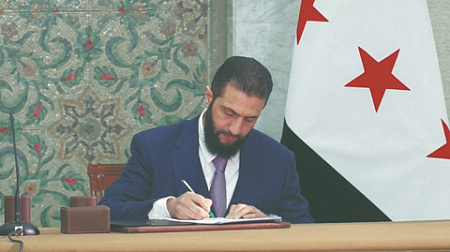
On March 13, Syrian Transitional President Ahmed al-Sharaa signed the text of the Constitutional Declaration, which is intended to become the country’s legal basis for political transit. It introduces a presidential form of government and takes the principle of Islamic jurisprudence, fiqh, as the basis of legislation. But one of the newest points was the provision on the legal prosecution of former supporters of fugitive President Bashar al-Assad.
Al-Sharaa signed the text of the Constitutional Declaration on Thursday in Damascus. This happened to the sound of Israeli air strikes, whose fighter jets targeted one of the districts in the north-west of the capital under the pretext of fighting entrenched Palestinian militants.
In his speech, the President of the transitional period called the signing an important step for the Syrian people “on the path to creation and development.” “We hope that this will be a new story for Syria, in which we will replace ignorance with knowledge and suffering with mercy,” said the former field commander, who once led the jihadist group Hayat Tahrir al-Sham (recognized as terrorist in Russia and banned).
According to the text of the Constitutional Declaration, the main source of legislation in Syria for the transitional period is Fiqh, a principle of Islamic jurisprudence that allows specific Muslim legal rules to change following changes in the era and circumstances. The official form of government during transit is the presidential republic, in which executive power is concentrated in the hands of the President. His position can only be held by a Muslim. The document does not assume the post of Prime Minister. However, the Constitutional Declaration gives the People’s Council (the legislative body) the right to remove the President or limit his official powers at its discretion.
The Constitutional Declaration says that the period of political transit in Syria can last up to five years. At the same time, only the central government, represented by a unified army, is given the right to own weapons, and the main task of the armed forces becomes “protecting the homeland and Syrian citizens, maintaining civil peace in the country.”
The legal framework approved by al-Sharaa is likely to be temporary. As members of the committee that drafted the Constitutional Declaration explained to the Qatari newspaper Al-Arabi al-Jadid, the adopted version of the document is based mainly on previous versions of the Syrian Constitution, especially the 1950 edition, and is designed to respond to the challenges that the state faces during the transit period. But as the committee members announced, in previous Syrian Constitutions, the text served exclusively “the dictator, but today the work of all authorities is controlled by the people.”
An important legislative change, however, is that the declaration contains a clause on “transitional justice,” a mechanism designed to ensure that former Assad supporters are held accountable for their actions during the civil war. At the same time, Al-Arabi al-Jadid’s sources draw attention to the fact that attempts by foreign players to undermine internal stability are constitutionally criminalized. These days, Damascus has been trying to blame abstract external forces for the massacre in the coastal provinces, which occurred after the security forces of the transitional government wanted to suppress the uprising of former Assad supporters.
Kirill Semenov, an expert at the Russian International Affairs Council, explained to NG that the wording of the adopted Constitutional Declaration actually repeats the provisions of the old versions of the Syrian Constitution. “The language is Arabic, the president is a Muslim, and Islamic Fiqh is the basis of legislation: no changes have taken place,” the source told NG. “As for the rights of minorities, it is necessary to understand what will be the attitude, for example, to Alawites or Druze – whether they will be considered Muslims or not.”
An important aspect is related to the official languages of the country. The Constitutional Declaration approves only Arabic in this status. And, as Kirill Semenov pointed out, al-Sharaa, according to some reports, promised the Kurdish commanders during the peace talks to make the Kurdish language one of the official languages. The NG interlocutor emphasizes that the basis of legislation for the period of political transit is precisely Islamic Fiqh, and not the Sharia judicial system, which is more demanding and more comprehensive. If the former Syria was formally considered secular on the basis of its former Constitution, then a similar judgment is valid for the current one, the expert concluded.
